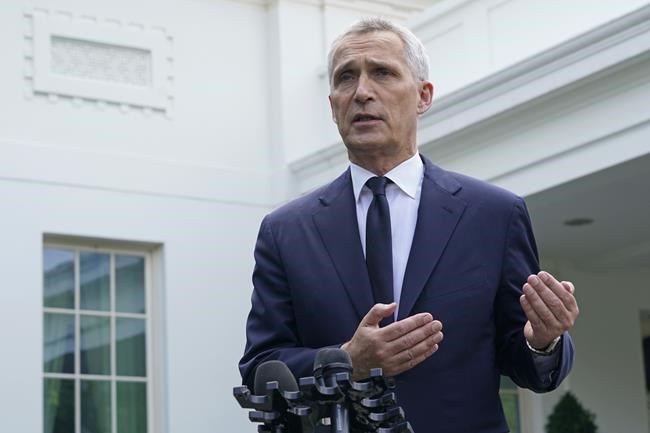BRUSSELS (AP) — NATO Secretary-General Jens Stoltenberg will stay in office for another year, the 31-nation military alliance decided on Tuesday.
Stoltenberg said in a tweet that he is “honoured by NATO Allies’ decision to extend my term as Secretary General until 1 October 2024.”
“The transatlantic bond between Europe and North America has ensured our freedom and security for nearly 75 years, and in a more dangerous world, our Alliance is more important than ever,” he said.
Stoltenberg, a former Norwegian prime minister, has been NATO’s top civilian official since 2014. His term had been due to expire last year but was extended then to keep a steady hand at the helm after Russia’s full-scale invasion of Ukraine in February 2022.
U.S. President Joe Biden and his NATO counterparts had been due to name a successor when they meet in Vilnius, Lithuania, on July 11-12. But the world’s biggest security organization makes decisions by consensus, and no agreement could be found on a new candidate.
Most NATO countries had been keen to name a woman to the top post, and Danish Prime Minister Mette Frederiksen was thought to be a favorite after a meeting with Biden last month.
The president of the European Commission, Ursula von der Leyen, ruled out her candidacy. Other possible names floated, but never publicly named as in the running, were Dutch Prime Minister Mark Rutte and U.K. Defense Secretary Ben Wallace.
It’s the fourth time Stoltenberg has had his mandate extended. He’s the second-longest serving NATO secretary-general after former Dutch foreign minister Joseph Luns, who spent almost 13 years at the helm from 1971.
Quizzed repeatedly in recent weeks over whether he would agree to have his term renewed, Stoltenberg said that he was not seeking to stay and had no plans other than to continue to carry out his duties and wrap his time at the helm in September.
NATO secretaries-general are responsible for chairing meetings and guiding sometimes delicate consultations between the member countries to ensure that compromises are found so that an organization that operates on consensus can continue to function.
They also ensure that decisions are put into action and speak on behalf of all nations with one voice.
Stoltenberg has managed to tread a very fine line, refraining from criticizing members led by more go-it-alone presidents and prime ministers, like former U.S. President Donald Trump, Turkish President Recep Tayyip Erdogan or Hungarian Prime Minister Viktor Orban.
With NATO’s historical adversary, Russia, locked in a war with Ukraine, the process of naming a new secretary-general has become highly politicized.
Poland opposes the next secretary-general coming from a Nordic state after Stoltenberg’s long tenure, and that of his predecessor, Anders Fogh Rasmussen from Denmark. Polish officials wanted someone from a Baltic state. Estonian Prime Minister Kaja Kallas was a preferred candidate.
But other countries are wary of accepting a nominee from the Baltics or Poland, given what appears to be their unconditional support for Ukraine, including on NATO membership, which the U.S. and Germany, among others, insist should not happen before the war ends.
In naming Fogh Rasmussen, a former Danish premier, their 12th secretary general in 2009, NATO’s leaders signaled that they wanted a government leader or president at the head of their organization. This has made the path almost impossible for Wallace.
Lorne Cook, The Associated Press



